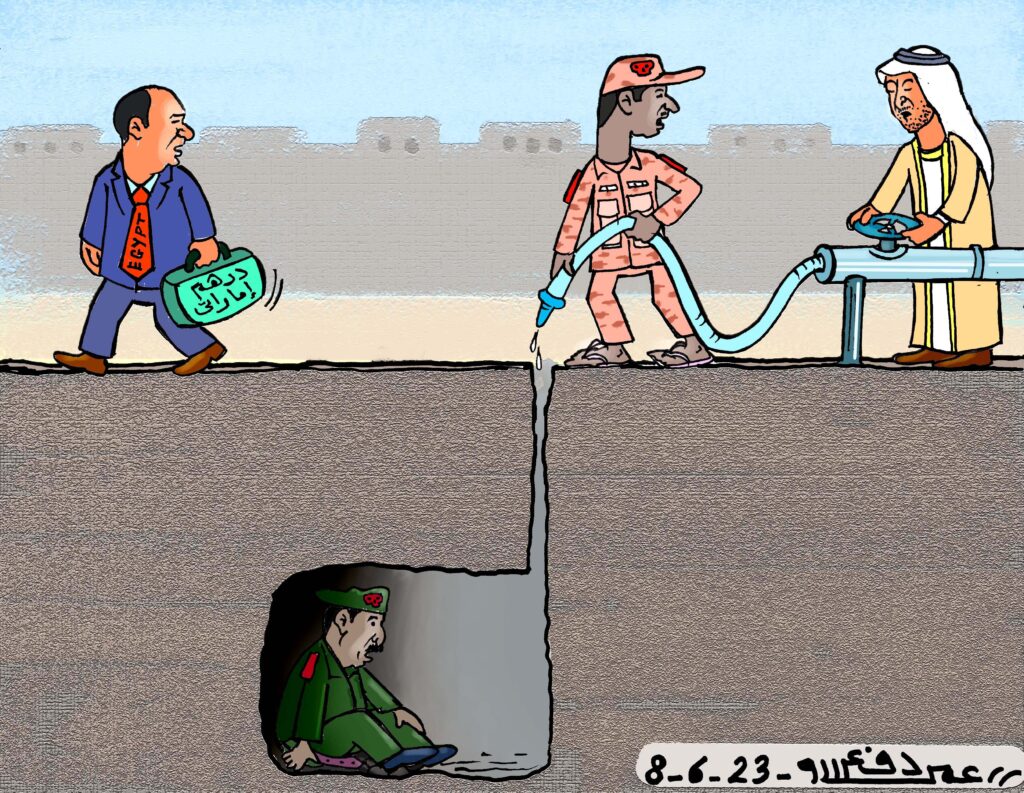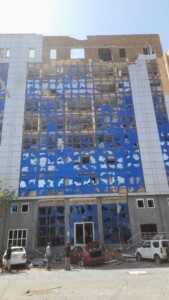Sudanese expats in UAE ‘nervous’ as diplomatic tensions rise

Regional diplomacy: El Burhan is trapped in a cellar (read: General Command), the UAE helps the RSF whilst Egypt quietly walks away with UAE money (despite its public support of El Burhan) - Cartoon by Omar Dafallah, June 8 (RD)
Sudanese living in the United Arab Emirates (UAE) are watching closely as tensions simmer between their country of origin and their host country. Last week, Sudan Armed Forces (SAF) Deputy Commander Yasir El Atta publicly accused “mafia-state” UAE of financing their warring rival, the paramilitary Rapid Support Forces (RSF).
“We are unable to sleep at night, worrying about our fate and the fate of our families if the relationship between Sudan and the Emirates deteriorates for the worse,” says Fathi Ahmed, a 42-year-old Sudanese mechanical engineer who has been working in the UAE for the last 10 years.
Like Fathi, hundreds of thousands of Sudanese immigrants working in the Gulf, , are following with great concern the deterioration of official relations between the two countries over the last week.
About 200,000 Sudanese live and work in the UAE. They fear the Emirati government, in response to El Atta’s accusations, might impose measures ranging from “restrictions using judicial and administrative measures”, all the way to “the nightmarish scenario of a mass expulsion of Sudanese from the Emirates,” a scenario that would affect millions, including family members and relatives who depend on their income, “especially in light of the bitter war that left them with no source of income except remittances from expatriates.”
But a Sudanese banker working in the Emirates, who preferred to withhold his name, believes that the concerns of fellow Sudanese expats like Fathi are greatly exaggerated. “Emirati authorities have taken the initiative to provide great facilities to Sudanese residents and visitors, exempting us from [visa renewal] delay fines and creating an ’emergency residency’ to allow Sudanese people to continue their stay.” He thus ruled out the UAE government taking measures that would harm “hundreds of thousands of Sudanese who have lived and worked there for decades, no matter how its official relations with the Sudanese government have deteriorated.”
Tensions
Although media outlets and journalists close to the Sudanese army have been accusing the UAE of supporting the RSF since the onset of war in April, the leadership of the SAF had not publicly directed these accusations against the UAE until last week when the deputy commander-in-chief of the SAF, made strongly worded accusations against the UAE – which some observers described as lacking the necessary diplomatic decency in international relations.
On November 28, in a (subsequently redacted) video recorded at the Military Intelligence Command in Wadi Sedna base north of Omdurman, Gen El Atta labelled the UAE as “a mafia state that loves ruin and walks in the footsteps of evil”.
A few days later, pro-SAF demonstrators in Port Sudan, capital of Red Sea state and administrative capital of Sudan since the outbreak of war, called for the expulsion of the UAE ambassador from the country, according to multiple news reports.
Back in August, a report by the independent Arab channel Almayadeen followed an Emirati cargo plane marked as aid for Sudanese refugees that landed in Entebbe, Uganda’s main airport, in early June. Upon inspection, Ugandan authorities said they discovered dozens of crates in the plane’s cargo hold stocked with ammunition, assault weapons, and other small weaponry, instead of the food and medical supplies indicated on the aircraft’s manifest.
Economic ties
The disastrous consequences of the deterioration of Sudanese-Emirati relations will not be limited to Sudanese expatriates in the Emirates, but will likely go beyond and affect the entire Sudanese economy, given the UAE’s status as Sudan’s first and primary trading partner over the past two decades, as 45 per cent of Sudan’s exports go to the UAE and 31 per cent of Sudan’s imports come from the UAE, according to 2022 statistics.
Sudan’s dependence on the UAE market for export and import has been consolidated throughout more than three decades of international sanctions imposed on the country during the era of former president Omar Al Bashir due to the atrocities committed in the Darfur war since 2003 and support for terrorism.
Since that time, the Sudanese government and businessmen have made use of the UAE as a centre for international trade and a market to import and re-export Sudanese goods, especially gold, gum Arabic, and oilseeds, and to import crucial goods into the Sudanese market. It may be difficult for Sudan to find another outlet that is as close, flexible, and low in fees and taxes as the UAE, at least during the ongoing war which has caused huge losses to hundreds of Sudanese businessmen, and the prices of imported goods in Sudan to soar.
What to expect?
Leaders of the Gulf Cooperation Council (GCC) countries have often stated that the conditions of immigrants working in their respective states are not affected by their political relationship with the governments of their countries of origin, but recent history does not support such assertions.
Hundreds of thousands of foreigners, especially Arabs, were expelled from Kuwait after its liberation from the Iraqi occupation in 1991, according to their countries’ positions on the Iraqi invasion. Thousands of Lebanese Shiites were also expelled from GCC countries due to Hezbollah’s pro-Iran positions, and Syrians from the Alawite sect were subjected to inferior treatment due to the civil war in Syria, and there is no reason for the Sudanese to be an exception.
Facing uncertainty, Sudanese in the UAE called for active action by Sudanese political and societal forces to communicate with state leaders and opinion makers in the oil-rich country to defend the interests of the Sudanese, protect them from the consequences of a war in which they have no business, and to clarify that the political and diplomatic positions of the Sovereignty Council, headed by SAF Commander-in-Chief Abdelfattah El Burhan, does not represent them and they “should not pay the price for it”.











 and then
and then